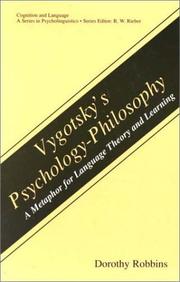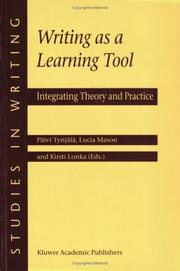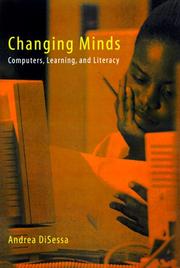| Listing 1 - 10 of 29 | << page >> |
Sort by
|

ISBN: 0306464233 146135482X 146151293X Year: 2001 Publisher: New York, N.Y. Kluwer Academic
Abstract | Keywords | Export | Availability | Bookmark
 Loading...
Loading...Choose an application
- Reference Manager
- EndNote
- RefWorks (Direct export to RefWorks)
You hold in your hands a new book. Professor Dorothy Robbins dedicated it to one of the aspects of the cultural heritage of the famous psychologist L. S. Vygot sky. His activity (deyatelnost) was multifaceted. He had input into different fields of psychology: its methodology, psychology of art, pathopsychology, the psy chology of child and adolescent development, pedagogical psychology, general psychology, speech psychology, and other fields. Within his various activities he enriched not only psychology, but a variety of different sciences/academics pedagogics, defectology, psychiatry, literary critical theory, and linguistics. Some famous scientists feel that he left his mark in fields of various scientific areas that did not exist during his lifetime-such as psycho linguistics, semiotics, and cybernetics. Many psychologists and linguists conduct research in the spirit of his ideas that are contained within his approach of cultural-historical theory of human psy chological development, all created by Vygotsky as early as the 1920s and 1930s; these ideas have become popular among scientists in different countries in the last decades. The use of Vygotsky's theories, even beyond the frame of psychol ogy, turns out to be fruitful. I hope that this new book by Dorothy Robbins will help readers understand the deeper meaning of the scientific/academic research undertaken by my father and the scientific results that were obtained by him.
Psycholinguistics --- Vygotsky, Lev Semënovic --- Psychology --- Experimentele psychologie --- History. --- psycholinguistiek --- psycholinguistiek. --- Cognitive psychology. --- Linguistics. --- Education. --- Cognitive Psychology. --- Linguistics, general. --- Education, general. --- Children --- Education, Primitive --- Education of children --- Human resource development --- Instruction --- Pedagogy --- Schooling --- Students --- Youth --- Civilization --- Learning and scholarship --- Mental discipline --- Schools --- Teaching --- Training --- Linguistic science --- Science of language --- Language and languages --- Psychology, Cognitive --- Cognitive science --- Education

ISBN: 0792368770 0792369149 9401007403 Year: 2001 Publisher: Dordrecht Kluwer Academic
Abstract | Keywords | Export | Availability | Bookmark
 Loading...
Loading...Choose an application
- Reference Manager
- EndNote
- RefWorks (Direct export to RefWorks)
In a brief summary, the debate concerning the nature of writing processes is about whether the essential characteristic of expertise in writing is a matter of mastering problem-solving strategies. In this respect, the role of social and interactive factors, such as writers' familiarity with the particular genre in which they are writing and their relationship with the discourse community in which they are participating, have been pointed out (e.g. Nystrand, 1989). According to the socio-interactive approach, which refers to Vygotsky's theory, the composition process is a dialogue between the writer and the reader made possible by socially shared knowledge. The meaning of a text is a social construct that is negotiated between the reader and the writer through the medium of the text. The importance of motivational aspects has also been highlighted by two main lines of research, studies of the relationship between writing and self-efficacy (e.g. Pajares & Johnson, 1994, 1996) and studies of the role of interest in the production of expository texts (e.g. Albin, Benton & Khramtsova, 1996; Benton, Corkill, Sharp, Downey, Khramtsova, 1995; Hidi & McLaren, 1990, 1991). Self-efficacy, in this context individuals' beliefs about their ability to produce certain types of texts, have been found to be predictive of writing skills, strategy use and writing performance. .
Psycholinguistics --- Didactics of languages --- Learning. --- Instruction. --- Education. --- Cognitive psychology. --- Applied linguistics. --- Learning & Instruction. --- Education, general. --- Cognitive Psychology. --- Applied Linguistics. --- Linguistics --- Psychology, Cognitive --- Cognitive science --- Psychology --- Children --- Education, Primitive --- Education of children --- Human resource development --- Instruction --- Pedagogy --- Schooling --- Students --- Youth --- Civilization --- Learning and scholarship --- Mental discipline --- Schools --- Teaching --- Training --- Learning process --- Comprehension --- Education
Periodical
Abstract | Keywords | Export | Availability | Bookmark
 Loading...
Loading...Choose an application
- Reference Manager
- EndNote
- RefWorks (Direct export to RefWorks)
Nursing --- Education, Nursing --- Study and teaching --- Education, Nursing. --- Study and teaching. --- Nursing Education --- Educations, Nursing --- Nursing Educations --- Nurses --- Nursing Care --- Students, Nursing --- Clinical nursing --- Nurses and nursing --- Nursing process --- education --- Medical education --- Care of the sick --- Medicine --- Soins infirmiers --- Verpleegkunde. --- Étude et enseignement --- verpleegkundigen --- nurses --- onderwijs --- gezondheidszorg --- health care --- geneeskunde --- medicine --- volksgezondheid --- public health --- Education (General) --- Medicine (General) --- Onderwijs (algemeen) --- Geneeskunde (algemeen) --- Education
Periodical
Abstract | Keywords | Export | Availability | Bookmark
 Loading...
Loading...Choose an application
- Reference Manager
- EndNote
- RefWorks (Direct export to RefWorks)
Language arts (Early childhood) --- Early childhood education --- Alfabetisme. --- Kinderen. --- Taalvaardigheid. --- Language arts --- Study and teaching (Early childhood) --- Study and teaching --- Education --- 05.15 reading. --- Early childhood education. --- Literacy --- Reading (Early childhood) --- Literacy. --- geletterdheid --- literacy --- kinderen --- children --- Education (General) --- Onderwijs (algemeen) --- Reading --- Illiteracy --- General education --- Arts and Humanities. --- Education & Careers --- General and Others. --- Arts and Humanities --- General and Others

ISBN: 0792371593 9780792371595 0792369807 9780792369806 9401008043 Year: 2001 Publisher: Dordrecht Kluwer Academic
Abstract | Keywords | Export | Availability | Bookmark
 Loading...
Loading...Choose an application
- Reference Manager
- EndNote
- RefWorks (Direct export to RefWorks)
"This book provides both young and senior scientists with a comparative view of current theoretical models of text production. Models are clearly situated in their historical context, scrutinized in their further evolution with a fine-grained observation of differences between models." "Following the description of writing phases initially proposed by Hayes and Flower (1980), the first part of the book presents planning, translating and revising processes and compares them to other researchers' conceptions. The second part is devoted to the cognitive functioning of writing. Decisive issues are examined like the management of different processes, the role of working memory in text writing and the characteristic of the development of writing expertise. The book concludes with the commentaries of two prominent researchers in this field, John R. Hayes and Ronald T. Kellogg, who have been invited to react to analyses developed in the book and to complete the presentation of their own model." "Very complete and informative to read, this book will be useful to people working in the teaching of writing or studying this specific human activity."--BOOK JACKET.
Writing --- Languages & Literatures --- Philology & Linguistics --- Cognitieve processen. --- Modellen. --- Psychologie. --- Schreiben. --- Schrijven. --- Textproduktion. --- Wetenschappelijke teksten. --- Writing. --- Psycholinguistics --- Didactics of languages --- Cognitive psychology. --- Education. --- Cognitive Psychology. --- Education, general. --- Children --- Education, Primitive --- Education of children --- Human resource development --- Instruction --- Pedagogy --- Schooling --- Students --- Youth --- Civilization --- Learning and scholarship --- Mental discipline --- Schools --- Teaching --- Training --- Psychology, Cognitive --- Cognitive science --- Psychology --- Education

ISBN: 0262041804 0262541327 0585371849 0262271761 9780585371849 9780262041805 9780262271769 9780262541329 Year: 2001 Publisher: Cambridge (Mass.) MIT Press
Abstract | Keywords | Export | Availability | Bookmark
 Loading...
Loading...Choose an application
- Reference Manager
- EndNote
- RefWorks (Direct export to RefWorks)
Andrea diSessa's career as a scholar, technologist, and teacher has been driven by one important question: can education -- in particular, science education -- be transformed by the computer so that children can learn more, learn more easily at an earlier age, and learn with pleasure and commitment? This book is diSessa's informed and passionate affirmative answer to that question. While written at a level that anyone with a good acquaintance with high school science can understand, the book reflects the depth and breadth of the issues surrounding technology in education. Rejecting the simplistic notion that the computer is merely a tool for more efficient instruction, diSessa shows how computers can be the basis for a new literacy that will change how people think and learn. He discusses the learning theory that explains why computers can be such powerful catalysts for change in education, in particular, how intuitive knowledge is the platform on which students build scientific understanding. He also discusses the material and social reasons for the computer's potential and argues for "two-way literacies," where everyone is a creator as well as consumer of dynamic and interactive expressive forms. DiSessa gives many examples from his work using the Boxer computer environment, an integrated software system designed to investigate computational literacies.
Education --- Social Sciences --- Theory & Practice of Education --- Learning, Psychology of. --- Literacy. --- Pedagogiek en onderwijskunde --- Data processing. --- onderwijstechnologie --- onderwijstechnologie. --- EDUCATION/General --- COMPUTER SCIENCE/General --- Illiteracy --- General education --- Learning --- Psychology of learning --- Educational psychology --- Comprehension --- Learning ability --- Computer uses in education --- Computers in education --- Educational computing --- Microcomputer uses in education --- Microcomputers in education --- Psychological aspects
Book
ISBN: 1462309569 1452727023 1282110055 1451899033 9786613802941 Year: 2001 Publisher: Washington, D.C. : International Monetary Fund,
Abstract | Keywords | Export | Availability | Bookmark
 Loading...
Loading...Choose an application
- Reference Manager
- EndNote
- RefWorks (Direct export to RefWorks)
This study confirms a strong and robust relationship between economic growth and poverty reduction in sub-Saharan Africa. Employing a panel of 46 countries covering the period 1972-97, the analysis finds that a 10 percent increase in per capita GDP leads to a 1 percent increase in life expectancy, a 3-4 percent decline in infant mortality rates, and a 3½-4 percent increase in the rate of gross primary school enrollment. The results are robust for high- and low-income, as well as fast- and slow-growth, countries. The study also finds that quality of growth, civil conflict, HIV/AIDs, civil and institutional freedom, and island economies are important control variables that help explain the variability of poverty across Africa. A country's latitude is not found to be a significant factor explaining life expectancy or infant mortality rates, though it is a significant factor explaining gross primary school enrollments.
Macroeconomics --- Social Services and Welfare --- Poverty and Homelessness --- Health Behavior --- General Welfare --- Economic Development: General --- Personal Income, Wealth, and Their Distributions --- Health: General --- Welfare, Well-Being, and Poverty: General --- Education: General --- Government Policy --- Provision and Effects of Welfare Program --- Health economics --- Poverty & precarity --- Education --- Social welfare & social services --- Personal income --- Health --- Poverty --- Poverty reduction --- National accounts --- Income --- United States
Book
ISBN: 1462344879 1452767386 1282101382 1451899599 9786613799470 Year: 2001 Publisher: Washington, D.C. : International Monetary Fund,
Abstract | Keywords | Export | Availability | Bookmark
 Loading...
Loading...Choose an application
- Reference Manager
- EndNote
- RefWorks (Direct export to RefWorks)
This paper provides a quantitative assessment of the impact of economic growth in the United States on growth in other countries. Using panel data estimation, the paper finds a significant positive impact of U.S. growth on growth in the rest of the world, especially developing countries, during the past few decades. The evidence suggests that the impact of U.S. growth on other countries can be explained by the significance of the United States as a global trading partner. The paper provides estimates of the direct impact of trade with the United States on growth in several individual countries.
Exports and Imports --- Inflation --- Macroeconomics --- Demography --- Trade: General --- Macroeconomics: Consumption --- Saving --- Wealth --- Demographic Trends, Macroeconomic Effects, and Forecasts --- Retail and Wholesale Trade --- e-Commerce --- Price Level --- Deflation --- Education: General --- International economics --- Population & migration geography --- Education --- Exports --- Government consumption --- Population growth --- Trade in goods --- International trade --- National accounts --- Population and demographics --- Consumption --- Economics --- Population --- Balance of trade --- Prices --- United States --- E-Commerce
Book
ISBN: 1462327737 1452787573 1281430560 9786613780416 145189855X Year: 2001 Publisher: Washington, D.C. : International Monetary Fund,
Abstract | Keywords | Export | Availability | Bookmark
 Loading...
Loading...Choose an application
- Reference Manager
- EndNote
- RefWorks (Direct export to RefWorks)
The impact of public education expenditure on human capital, the supply of different labor skills, and its macroeconomic and distributional consequences is appraised within a multisector CGE model. The model is applied to and calibrated for two Heavily Indebted Poor Countries (HIPCs), Tanzania and Zambia. The simulation results suggest that education expenditure can raise economic growth. However, to maximize benefits from education expenditure, a sufficiently high level of physical investment is needed, as are measures that improve the match between the pattern of educational output and the structure of effective demand for labor. An important result of the simulation experiments is that a well-targeted pattern of education expenditure can be effective for poverty alleviation.
Labor --- Macroeconomics --- Public Finance --- National Government Expenditures and Education --- Demand and Supply of Labor: General --- Wages, Compensation, and Labor Costs: General --- Labor Economics: General --- Education: General --- Labour --- income economics --- Public finance & taxation --- Education --- Education spending --- Labor supply --- Wages --- Expenditure --- Expenditures, Public --- Labor market --- Labor economics --- Zambia --- Income economics
Book
ISBN: 1462337791 1452709866 1282108131 9786613801487 1451900236 Year: 2001 Publisher: Washington, D.C. : International Monetary Fund,
Abstract | Keywords | Export | Availability | Bookmark
 Loading...
Loading...Choose an application
- Reference Manager
- EndNote
- RefWorks (Direct export to RefWorks)
This paper estimates the impact of public spending on the poor's health status in over 70 countries. It provides evidence that the poor have significantly worse health status than the rich and that they are more favorably affected by public spending on health care. An important new result is that the relationship between public spending and the health status of the poor is stronger in low-income countries than in higher-income countries. However, the results suggest that increased public spending alone will not be sufficient to meet international commitments for improvements in health status.
Public Finance --- Health Policy --- Health Behavior --- Health: Government Policy --- Regulation --- Public Health --- Welfare, Well-Being, and Poverty: General --- Health: General --- National Government Expenditures and Health --- National Government Expenditures and Related Policies: General --- Analysis of Health Care Markets --- Education: General --- Public finance & taxation --- Health economics --- Health systems & services --- Education --- Health --- Health care spending --- Expenditure --- Health care --- Expenditures, Public --- Medical care --- Egypt, Arab Republic of
| Listing 1 - 10 of 29 | << page >> |
Sort by
|

 Search
Search Feedback
Feedback About UniCat
About UniCat  Help
Help News
News